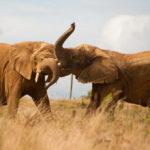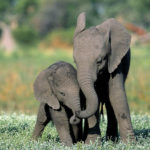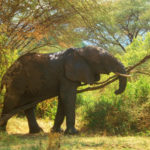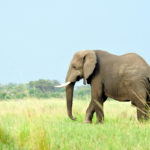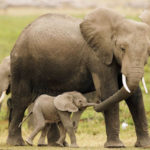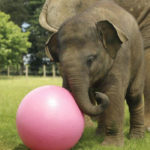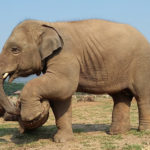Elephants – information
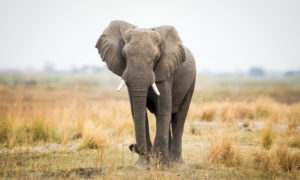 Elephants are a family that unites the largest and strongest living land mammals. These are tall, thick-skinned animals in the tropical regions of Asia and Africa. Elephants are divided into two genus – Indian elephants and African elephants.
Elephants are a family that unites the largest and strongest living land mammals. These are tall, thick-skinned animals in the tropical regions of Asia and Africa. Elephants are divided into two genus – Indian elephants and African elephants.
Elephants have a massive head and trunk, a long trunk, large fan-shaped ears and tusks. Deprived of bones, the muscular trunk of elephants is a fused and strongly elongated upper lip and nose. It is considered to be an intelligent beast, although his brain, albeit large in absolute dimensions, is disproportionately small in comparison with the enormous body weight.
These animals feed on young shoots of shrubs and trees, as well as tubers and even bark of trees. To maintain a normal weight and strength, the animal needs to receive about 250 kg of feed per day and 190 liters of water per day.
Elephants live in packs that consist of one to four families and unite under the guidance of one of the females 30-50 individuals, including a lot of elephants. The lifespan of elephants under favorable conditions can reach 60 years.
Watching these big animals, you feel to them an involuntary respect and admiration. It seems that they are very calm, intelligent and ancient animals. Of course, for Europeans, an elephant is just an inhabitant of a zoo or a circus, whereas for inhabitants of Asia and Africa it is an indispensable assistant for hundreds of years. We know so little about these amazing animals, and some of our knowledge is also erroneous, so let’s try to debunk some myths about elephants.
Elephants are afraid of mice. This is the most common myth about elephants, replicable even in children’s cartoons. Scientists have conducted several experiments, wishing to refute or confirm this belief. In a pile of elephant manure, researchers hid the mouse, hoping to show it to the elephants when they approach. It should be noted that, having noticed the mouse, the elephant was very surprised and preferred to retire. The experiment was repeated several times, and the result would be the same.
Elephants, after seeing the mouse, really preferred to stay away from it. This is not due to the fearfulness of elephants, but to their natural caution. These animals prefer to stay away from unknown and incomprehensible creatures, but do not panic at the same time. So this myth can be considered partly fair. In the course of other experiments, elephants did not rush at all, but quietly trampled on small rodents, which once again confirms the statement that there is no fear of mice in elephants.
